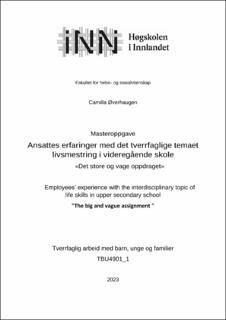Ansattes erfaringer med det tverrfaglige temaet livsmestring i videregående skole. «Det store og vage oppdraget»
Master thesis
Permanent lenke
https://hdl.handle.net/11250/3103356Utgivelsesdato
2023Metadata
Vis full innførselSamlinger
Sammendrag
Sammendrag
Da den nye læreplanen (LK20) kom i 2020, ble skolene introdusert for det nye tverrfaglige temaet folkehelse og livsmestring. I denne studien har jeg hatt som hensikt å undersøke livsmestringsaspektet ved det tverrfaglige temaet, og problemstillingen er: Hvilke erfaringer har ansatte med det nye tverrfaglige temaet livsmestring i videregående skole? For både å konkretisere og avgrense problemstillingen, ble følgende tre forskningsspørsmål reist:
- Hvordan forstår de ansatte oppdraget med livsmestring? - Hva legger de ansatte vekt på i arbeidet med livsmestring? - Hvilke endringer ønsker de ansatte seg i arbeidet med livsmestring?
Metoden som ble benyttet var en kvalitativ tilnærming gjennom to fokusgruppeintervjuer. Informantene bestod av til sammen tolv lærere, rådgivere, og skoleledere der alle arbeidet i videregående skole. Kirsti Malterud (2011) sin systematiske tekstkondensering ble brukt i analysen av datamaterialet.
Funnene viser som temaet på masteroppgaven er, at livsmestring som tverrfaglig tema fremstår som et stort og vagt oppdrag i læreplanen. Informantene hadde ulik forståelse og praktiserte det ulikt. Studien viser at livsmestring arbeides mest med gjennom «en helhetlig tilnærming» til elevene, der det legges vekt på å fremme en god psykisk helse, gode relasjoner, anerkjennelse, mestring og å gjøre elevene mer robuste. Livsmestring arbeides også med gjennom tverrfaglige prosjekter, dette kunne være gjennom mindre prosjekter, eller et større arbeid med temaet gjennom en «livsmestringsuke». Selv om informantene omtalte temaet som stort og vagt, viser studien at informantene besitter mye kunnskap om temaet. De etterlyser likevel struktur, rammer og mer samarbeid, da oppdraget fremstår upresist. De setter tverrsektorielt arbeid i sammenheng med livsmestring og etterlyser mer av dette, spesielt overfor elever som sliter psykisk. Funn viser også at informantene ser en utvikling i skolen de er usikre på hvordan de skal forholde seg til. De beskrev en stresset og sårbar ungdomsgenerasjon som trengte mye individuell tilpasning, samtidig er de usikre på om det individrettede fokuset nødvendigvis er til det beste for elevene. Abstract
When the new curriculum (LK20) came in 2020, schools were introduced to the new interdisciplinary topic of public health and life skills. In this study, my intention has been to examine the aspect of life skills of the interdisciplinary topic, and the question of issue is: What experiences do employees have with the new interdisciplinary topic of life skills in upper secondary school? To both specify and delimit the question of issue, the following three research questions were raised:
- How do the employees understand the assignment of life skills?- What do the employees emphasizes in their work with life skills?- What changes do the employees want in their work with life skills?
The method used was a qualitative approach through two focus group interviews. The informants consisted of a total of twelve teachers, counselors, and school leaders, all of whom worked in upper secondary school. Kirsti Malterud's (2011) “systematic text condensation” was used in the analysis of the data.
The findings show, as the topic of the master's thesis is, that life skills as an interdisciplinary topic appears as a large and vague assignment in the curriculum. The informants had different understandings and practiced it differently. The study shows that life skills is mostly worked on through "a holistic approach" to students, where emphasis is placed on promoting good mental health, good relationships, recognition, coping and making students more resilient. Life skills is also worked on through interdisciplinary projects, this could be through smaller projects, or a larger work through a "life mastery week". Although the informants referred to the topic as large and vague, the study shows that the informants possess a lot of knowledge about the topic. They are still calling for structure, frameworks, and more cooperation, as the assignment appears imprecise. They place cross-sectoral work in the context of life skills and call for more of this, especially for students who struggle mentally.Findings also show that the informants see a development in the school that they are unsure of how to deal with. They described a stressed and vulnerable youth generation that needed a lot of individual adaptation, at the same time they are unsure whether the individual focus is necessarily on the best interests of the students.
